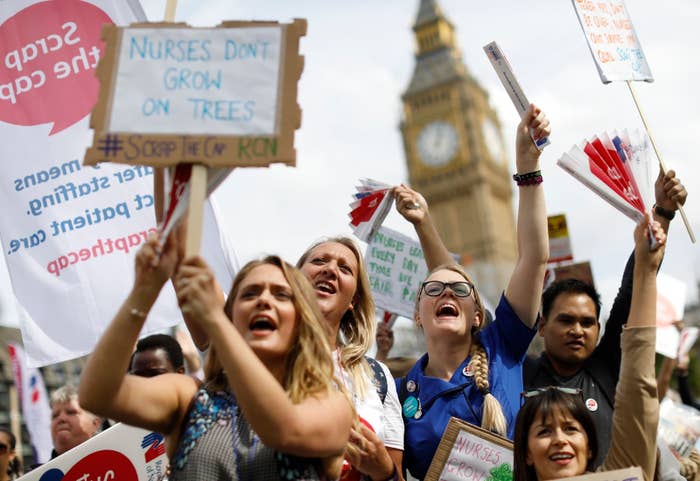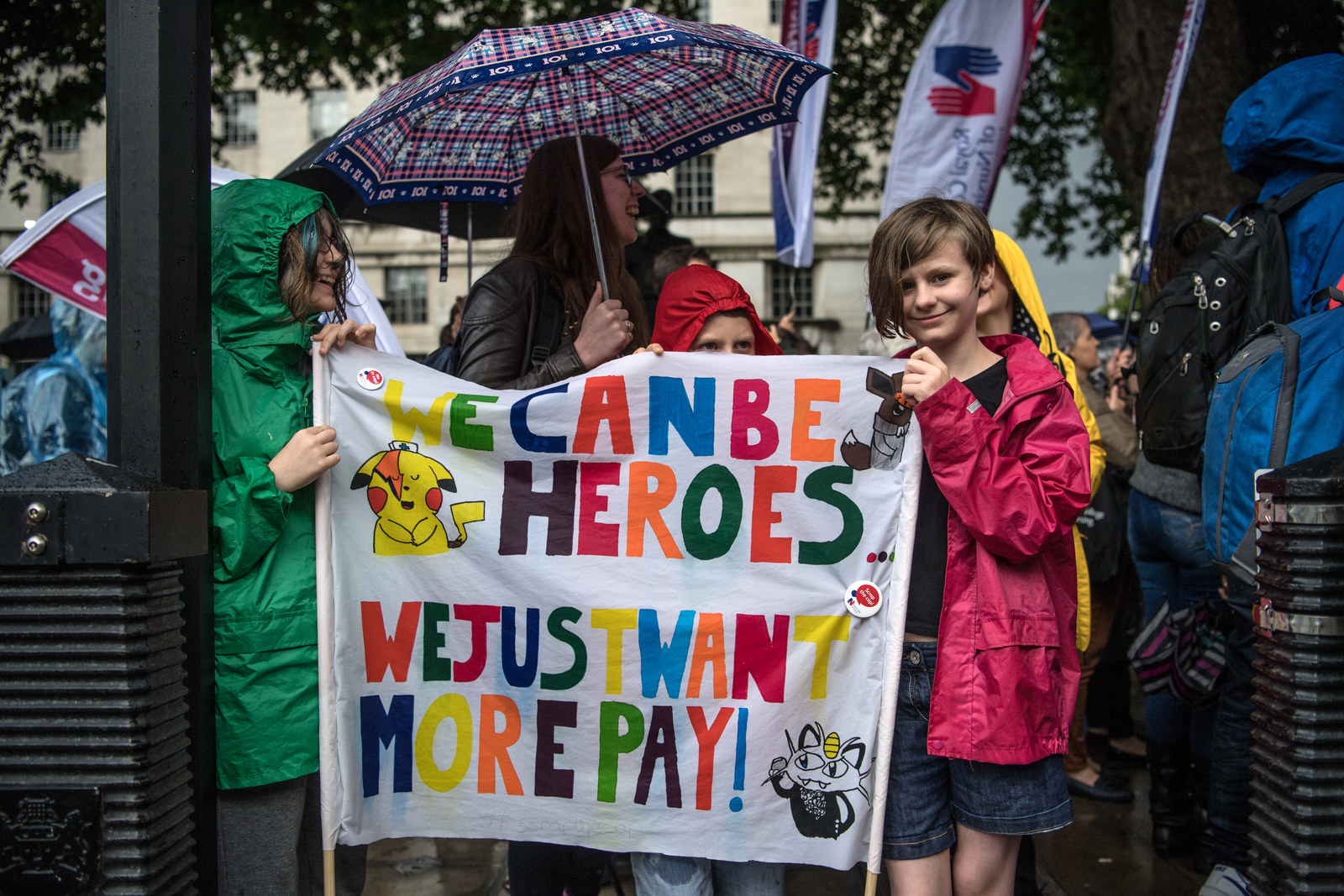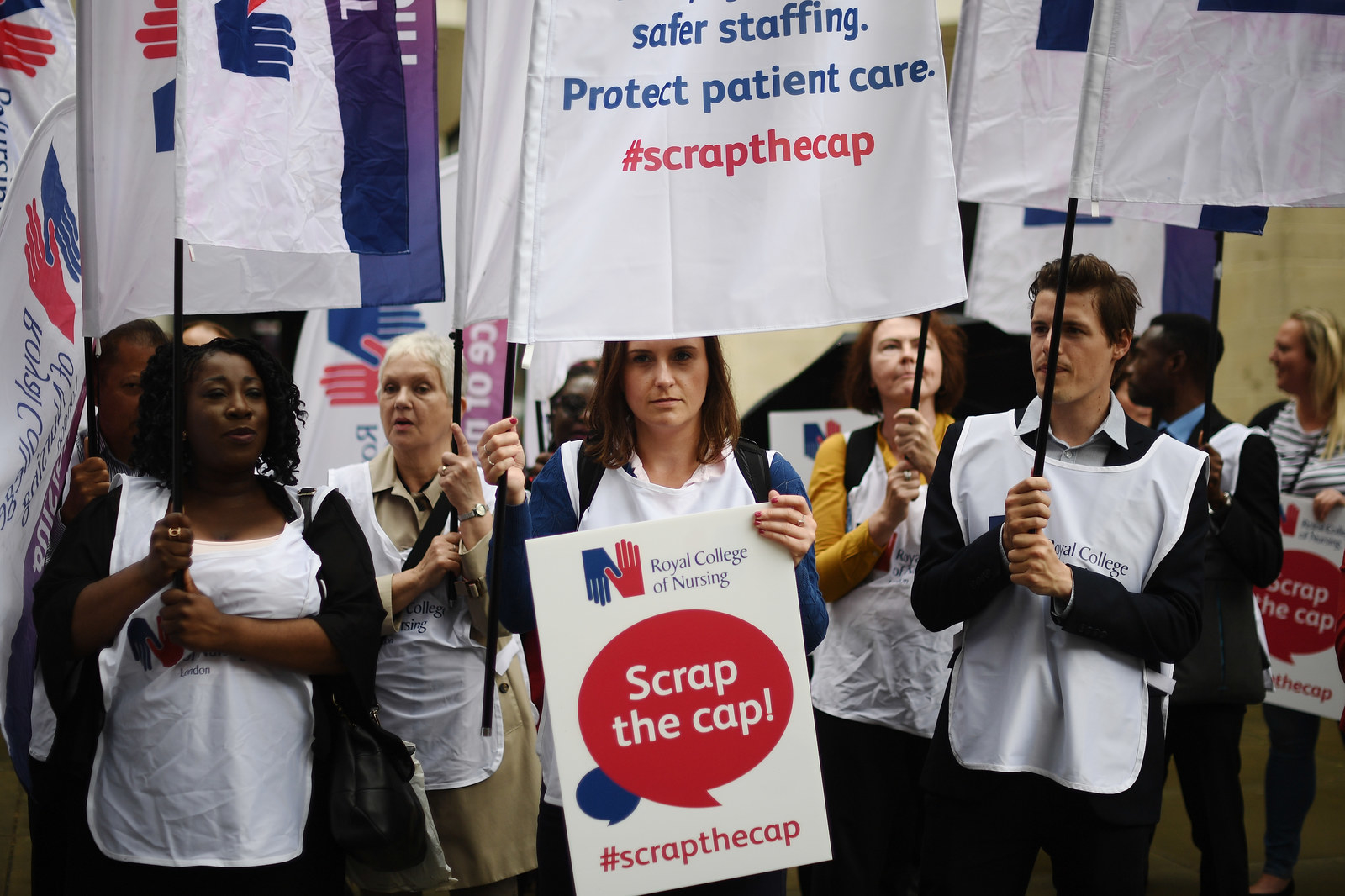
Almost three-quarters of people surveyed by the Royal College of Nursing believe there are not enough nurses to provide safe patient care.
The poll, conducted with YouGov last week, comes as separate new figures from the RCN show that job vacancies in nursing and midwifery are at a record high. There are currently 40,000 nursing vacancies in England, an overall increase of 5.2% since March.
Of more than 1,600 adults polled by the RCN over two days last week, 72% said they believed that there were too few nurses to provide safe patient care.
Nadia Trail, a RCN member and nurse at St Mary's hospital in Paddington, London, told BuzzFeed News she was disappointed but unsurprised by the finding.
"We’re very stretched. We’re a 12-bed ward, so we should have about three nurses on a shift but sometimes it’s one," she said.
"It can be difficult to make yourself available for every single patient.
"It’s not easy. It’s always the one where you say you’ll be back in a minute and the minute turns into an hour, and that turns into two. Eventually it’s not until the patient calls you again that you go back to them, because you’re just stretched so far.
"It is bad because we all came into nursing to provide care and make patients feel comfortable."
Sixty-eight per cent of those surveyed by the RCN believed that nurses are underpaid – including 58% of those who voted Conservative in June's snap general election – which many believe to be a significant factor in the shortage of nursing staff, as a result of qualified nurses leaving the profession or new nurses not training in the first place.
A few of the signs from @theRCN #scrapthecap march in Westminster.
On Wednesday nurses and their supporters gathered outside parliament in order to protest pay restrictions in the public sector, and the RCN has threatened strike action by its members if the pay cap is not lifted.
"I knew full well I wasn’t going to get rich doing this job. I do it because I love it, but we do need some incentive to get people coming into nursing," Amy a nurse from Basingstoke, told BuzzFeed News during the demonstration.
"We’re not asking for hundreds of thousands of pounds, we’re asking to be able to live."
Amy, a nurse in Basingstoke, says nobody becomes a nurse to get rich. "But we need enough money to live, to pay our… https://t.co/kvGIcEck5r
Liz, who had travelled from Wales for the demonstration told BuzzFeed News that she struggled to live off her nursing salary.
"I have to work extra agency shifts just to make ends meet every month," she said. "Your basic pay goes on bills, so if anything goes wrong there’s just nothing else in the budget."
Earlier this year reports circulated of nurses being forced to use food banks as their wage was simply not enough to live on.

Trail agreed that low pay was playing a significant part in stretching the workforce.
"We became nurses because we want to look after patients, but we have bills to pay," she said. "The hours that we work and the effort we put in, we just don’t feel that the money reflects that."
While she said dedication to the job kept many nurses in their posts, she worried that their patience was being tested by increasingly challenging working conditions.
"I think goodwill is already starting to run out, which is why we’re a position where patient care is slipping," she said. "We’ve reached a point where people are saying enough is enough. Goodwill can only take you so far."
The RCN is calling on the government to lift the 1% public sector pay cap in order to increase nursing pay. While efforts by Labour to lift the public sector pay cap were narrowly defeated in parliament earlier this summer, it has been suggested that the government may reverse this decision in November's Budget.
Ahead of Wednesday's protest, rapper Stormzy expressed his support for an increase in nursing pay.
Lift the pay cap you little pussyholes!!!! https://t.co/qgqdrsQj8L
Last year the government announced plans to replace bursaries for student nurses with a loans system in order to increase the number of nursing training places available. Since the changes have taken place, however, the number of people applying to study nursing has dropped significantly.
According to the RCN poll, 57% of members of the public surveyed said they would be willing to pay more tax in order to increase patient safety in the NHS.
Janet Davies, chief executive and general secretary of the RCN, accused ministers of being out of touch with public opinion, which the new poll suggested was in favour of NHS staff.
"They should heed this warning, scrap the pay cap, and help to recruit thousands more nurses for a safer NHS," she said.
“Experienced nursing staff are leaving in droves – not because they don’t like the job, but because they can’t afford to stay, while the next generation do not see their future in an undervalued profession.
“If the government fails to announce a change of direction in the Budget, then industrial action by nursing staff immediately goes on the table.”

Last year the government announced plans to replace bursaries for student nurses with a loans system in order to increase the number of nursing training places that were available. Since the changes have taken place, however, the number of people applying to study nursing has dropped significantly.
A Department of Health spokesperson said health secretary Jeremy Hunt had made clear that ministers were well aware of the pressures faced by frontline NHS staff, and that efforts were being made to recruit more nurses.
"The support and welfare of NHS staff is a top priority, and the government is committed to ensuring they can continue to deliver world-class patient care," the spokesperson said.
"We are helping the NHS to make sure it has the right staff, in the right place, at the right time to provide safe care – that’s why there are over 31,100 more professionally qualified clinical staff, including over 11,600 more doctors, and almost 12,000 more nurses on our wards since May 2010."
